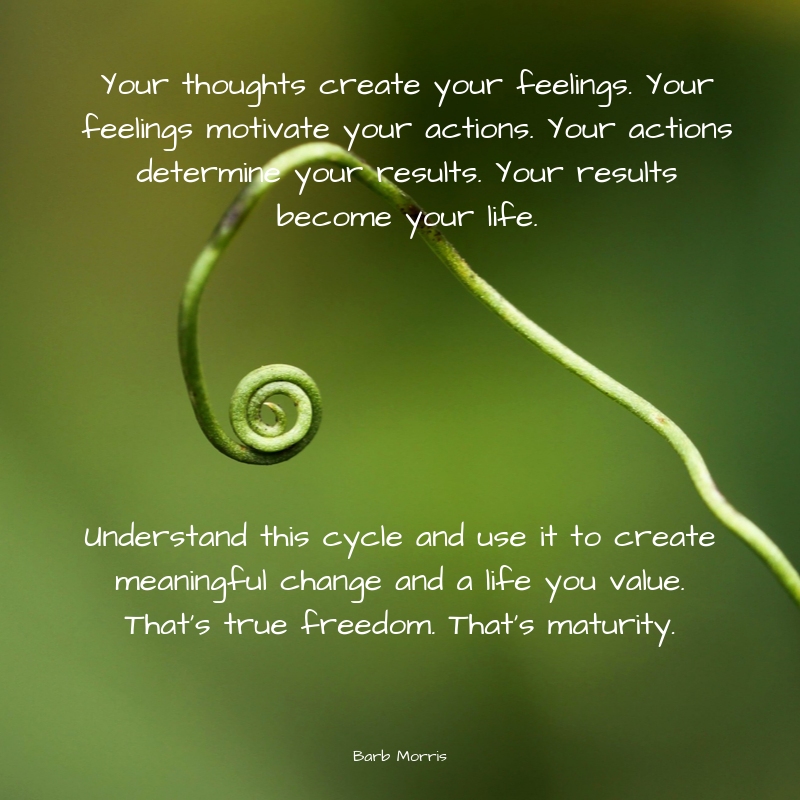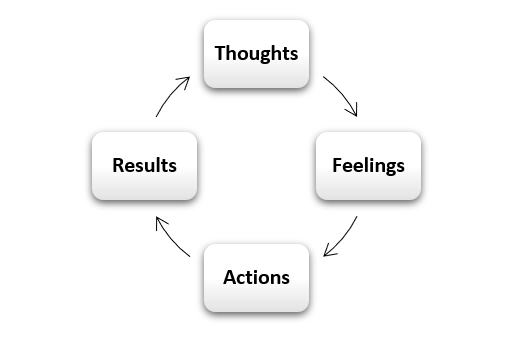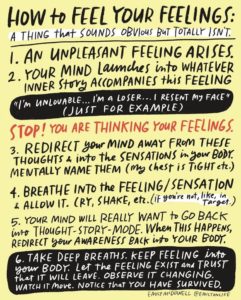
“When you complain, you make yourself a victim. Leave the situation, change the situation, or accept it. All else is madness.” ~Eckhart Tolle
Does that quote piss you off just a little? It does me. There are things I feel I ought to be able to complain about. Things that just aren’t right, but that don’t seem to be within my power to correct. Things like White nationalism, the persistence of misogynist patriarchy, and rampant capitalism, for example. But what good does complaining about any of that do? Nothing. Nada. Zilch. At least for me.
I believe Eckhart Tolle is correct. I make myself a victim when I complain. If a situation is truly intractable, the only sane course of action is to accept it. Because the above-mentioned forces are man-made (deliberate use of “man”), they are changeable. It’s just that changing them requires such hard work and an eye on the long game that they feel intractable.
I also see in myself a tendency to complain about situations I could leave or change, if I were willing to live with someone else’s anger or my own discomfort. I blame others for my choice to remain in situations that I don’t like. We complain when we don’t want to change, or when we feel powerless because the problem is so damn big. We choose not to change because we’re afraid of the hard work and the consequences.
I learned something in life coach training that blew my mind: Thoughts create feelings. I always thought it was the other way around. Nope. Here’s how it works:
Thoughts create feelings, which create actions, which create results, which lead to more thoughts, which create more feelings, which create more actions, which produce more results, which lead to more thoughts … on and on, around and around …

You can see how we can get ourselves pretty deep into a gnarly clusterf*ck if we don’t understand how this works.
Your thoughts create your feelings which motivate your actions which produce results. You then have thoughts about those results, which create feelings, which motivate actions, which produce more results. All of these results add up to your circumstances.
Of course, all of this is happening within the complex human ecosystem which is you. You exist within a matrix of material reality interwoven with Holy energy. And, as mentioned above, we live in a culture that privileges Whiteness, maleness, heterosexuality, and wealth, which certainly affects your life.
If you’re an adult and you’re reading this, your present circumstances are largely a product of your actions. You did this. Every step of the way. The circumstances in which you find yourself are the result of actions you took in response to feelings produced by your thoughts.
Although we like to blame others for our adult circumstances, unless you’re being held captive, that blame is probably not accurate. I’m NOT saying you caused your cancer or depression or whatever. I AM saying that if your cancer or depression or whatever is creating unnecessary suffering, you can allevate that suffering by taking responsibility for it. It may not be your fault, but it is your responsibility.
If you’re looking around at a life you didn’t intentionally create and you’re not thrilled about, it’s because you didn’t know about this cycle — how it works and how to create meaningful change for yourself.
How do you take responsibility for this cycle and the results it’s produced in your life? By understanding it and learning to intervene in it skillfully. To grow up is to understand this cycle and to use it to create the life you want.
Circumstances we don’t like and feelings we don’t like are where we usually notice distress, so it’s natural to think they are what we need to fix first.
We would be wrong.
Thoughts and actions are the only places we can break the cycle and put ourselves back in charge of our lives.
When we try to fix feelings without attending to the thoughts that drive them, we deny our feelings or numb them with addictions and compulsions. To alleviate uncomfortable feelings, we take impulsive actions, or no action at all because we feel paralyzed. These careless actions are useless at best, destructive at worst.
When we try to fix results of our clumsy actions without addressing the feelings and thoughts that drove those actions, we simply recreate the same circumstances over and over again. We all know people who’ve moved, changed jobs, coupled up or broken up, gone back to school, had a baby, or something else to alleviate the discomfort of their circumstances and feelings. Heck, I’ve done this myself a time or two. Wherever you go, there you are.
Unskillful interventions create more suffering in the long run, and they don’t produce lasting change and healing.
Skillful interventions, on the other hand, reduce suffering and result in long-term change and healing.
How do we intervene in this cycle skillfully and effectively?
A good place to start is to notice what you’re complaining about. If you complain about a circumstance in your life, you’re making yourself a victim. Stop it. Stop and look at what’s really going on. Follow the cycle backwards. Ask yourself these questions:
- What actions have I taken that resulted in this present circumstance?
- What feelings was I having that drove those actions?
- What thoughts created those feelings?
(A coach or other careful listener can be really helpful here, because we’re often blind to how the cycle has worked in our lives. If we could see it clearly, we’d make different choices!)
Actions: If you’re choosing destructive actions to alleviate feelings you don’t want to have, stop it. Are you overeating? Overdrinking? Overspending? Yelling at your kids or your spouse or the driver in front of you? And recognize that simply ceasing an action without attending to the feelings and thoughts that drive that action is unsustainable in the long run. Will power isn’t infinite.
Feelings: Uncomfortable feelings won’t kill you when you feel them. Feel your feelings all the way, and they lose their power. You’ll discover that you can feel your feelings and survive. Learning to feel feelings without needing to act on them in ways that are destructive to your life and your integrity – that’s freedom. That’s maturity.

Thoughts: The most effective and sustainable place to intervene in this cycle is with our thoughts. This is the bulk of the coaching I do, because most of us need help hearing our thoughts and changing them to thoughts that serve us.
Here’s an example from my own life. I feel embarrassed to share it. I also believe many of you can relate, so here goes.
I often crave potato chips, even when I’m not hungry. The cycle goes like this: I see potato chips and I think, “I deserve those today, I won’t be able to stand not eating them now that I see them, and a few won’t hurt me.” So I want them, I eat too many of them, and I feel overfull and not proud of myself. I haven’t acted in my own best interests and according to my values. This is what I did just a couple of days ago.
I could have interrupted this cycle in two places. I could have noticed the wanting, felt it all the way, and not eaten the potato chips. This is what I usually manage to do. The most powerful place to intervene, though, is with the thought, “I won’t be able to stand not eating them.” Because I know if I can just let that craving be what it is, it will eventually dissipate and I’ll be fine. The craving is just neurons firing in my brain, after all. Although it feels lethal, it’s not. This is getting easier and easier for me to do as I rewire my brain. I hardly ever eat when I’m not hungry anymore.
Now, for most of us, potato chips aren’t the end of the world. But sometimes, because we don’t know how this process works, we make choices with destructive consequences that are life-altering.
Looking back on my life, I can see how I’ve gotten where I am, both the good and the bad. I can draw a line from the circumstances in which I’m living now, back to the actions I took to manage the feelings I was having, and then even further back to the thoughts that drove those feelings, and the circumstances that created the thoughts, and so on and on and on.
Here in my 60s, I can see how choices I made when I was in my teens and 20s have resulted in a life that doesn’t fit in important ways. I can stop doing the things that hurt me, but it’s working with my thoughts that has created and continues to create lasting change and healing.
Because of what went down in my childhood family, I believed I wasn’t worthy of living my own life on my terms. My choices flowed from that core belief. The only way I’ve been able to heal is to examine those tangled beliefs, and to begin to learn to think different thoughts. It’s not easy. Lasting change rarely is.
Now that I know better, I can do better. So can you. Start with where you’re complaining, and work backwards. Contact me if you want to talk.

Thank you Barb! I’ve been complaining for months and months to my husband about the condition of our breakfast hangout. I s-l-o-w-l-y realized that my husband could do nothing about the situation. Last week I asked to speak to the manager. I shared my concerns with him and also expressed how much we wanted him to succeed in a neighborhood that has been declining. Breakfast was so much better this morning. I’m going to make a pledge to you to first notice when I complain and then in the words of you and therapist Bob Newhart, STOP IT!
I really like this post and not only because I taught this material for 25 years in interpersonal communication. I like it because it connects up with my current experience with tinnitus. One of the best current “treatments” is using meditation and cognitive behavioral therapy (CBT) to habituate to it or even make friends with it. In other words, to stop complaining and stop being anxious about it.
I love this. Thank you! I always loved that Eckhart statement. It’s so simple and true
.
One of the simplest demonstrations of how thoughts create feelings is thinking about a particular date, say your birthday. July 7th. You probably have fairly strong feelings, either positive or negative. Now ask any random group of people (except your parents most likely:-) “What feelings does the date July 7th bring up for you?” and unless they too have an event associated with that date, they won’t have *any* feelings. Because they won’t be thinking about parties or presents or getting older or anything else. They won’t have any “hooks”.
Pingback: The world is my field of practice. Unfortunately. | Barb Morris
Pingback: Seven good questions. | Barb Morris, Life Coach